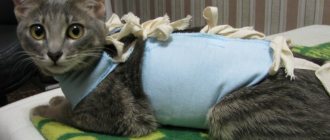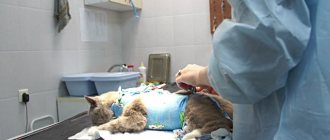According to veterinarians, a sterilized cat or neutered cat will not lose its hunting instincts, and therefore will continue to hunt rodents. Changes in character are possible, but there is no need to be afraid of drastic changes or increased laziness. To ensure that the medical procedure does not harm your pet, it is important to monitor the diet, follow the recommendations of veterinarians after surgery, and pay increased attention to the recovering animal.
To be or not to be castration
Sooner or later, owners are faced with the choice of whether to castrate their cat in order to eliminate the possibility of constant or occasional “March” sprees. Almost all cats mark their territory for a number of reasons, which is often the basis for the decision to castrate the animal.
To avoid your neighbor’s cats having offspring from your cat, you should take care to timely castrate your pet. The best option for carrying out such operations is considered to be a return of eight to nine months. During this period, the cat had not yet had time to go “fornication”, and, therefore, had not acquired the skills to mark the territory entrusted to him. The operation can also be performed at older ages.
Some owners prefer more gentle methods of dealing with seasonal surges in hormonal levels in cats, giving their pet special medications, for example, “Stop Intim”. In fact, this is not the best option for solving the problem, since such a drug will have to be given at certain intervals, and abuse can lead to the appearance of various diseases and even the formation of tumors.
Almost any cat can be castrated, if it is not a prize-winner of exhibitions and, therefore, an eligible bachelor, with glamorous cats on the waiting list for the year ahead. All other pets can be safely sent for the procedure if there are no other contraindications.
What causes the behavior of sterilized animals to change?
It's all about sex hormones. Castration itself, regardless of the type of procedure, is carried out to suppress the sexual function of the animal. As a rule, for this purpose the testes are surgically removed, but sometimes special medications are used that suppress the animal’s libido. Behavioral aspects change due to a sharp change in hormonal levels: in cats, it is sex hormones that are responsible for the territoriality of animals, for their desire to roam, etc.
It is also believed that testosterone is partly responsible for hunting “skills,” but this point is very controversial: rather, this model of behavior is inherent at the genetic level.
Do not forget that all cats are classic predators, and no amount of castration can influence this moment.
In a word, the cat should hunt mice even after sterilization... hypothetically. But in practice this does not always happen. Why does this happen and what factors can influence the character and hunting skills of your pet?
Firstly, the characteristics of the cat itself play a big role. If before castration he did not show any special skills in catching mice, then after the operation it would be somewhat stupid to wait for them to appear. True, sometimes there are exceptions. The neutered body does not have to be distracted by cats, and therefore the pet can switch to other activities. For example, hunting. But still, this happens infrequently and only in cases where your pet was initially active and curious.
Practice shows that every year the number of animals that can hunt well is falling. It's a matter of simple evolution - even stray cats can easily find food in the nearest trash can. There is no need to jump, run or sit in ambush for this. The situation is similar with pets. Why should a cat hunt if he is already fed? So more and more kittens have weak breadwinner skills. They simply do not need them, since they get food without much effort and in any volume.
Secondly, castration can lead to the accumulation of excess body weight . Simply put, your cat will become overfed. And this leads to a slowdown in metabolism, apathy, and other unpleasant consequences. It is quite logical that such an animal will no longer catch mice. To avoid this, a sterilized animal must be fed wisely, wisely choosing the appropriate diet.
In particular, it is necessary that the cat’s daily diet contains fewer nutrients. Neutered animals need significantly less energy, and therefore overfeeding is deadly for them. In addition, the pet must have unlimited access to clean drinking water at all times. This will also help maintain his body weight and thus maintain his hunting instincts.
Myths about castration
Before discussing the advantages and disadvantages of the procedure, you should understand how to correctly understand such formulations as castration and sterilization. There is a misconception that cats are castrated and cats are sterilized. Actually this is not true. Both male and female cats can be neutered, which means removing the uterus and ovaries of the female cat, and the removal of the testicles of the female cat. But during sterilization, only ligation of the spermatic cords in cats and the fallopian tubes in cats is carried out.
The second procedure is considered more loyal to the animal. After all, the recovery process in this case is much painless and faster. Already on the second or third day after the operation, the animal feels normal and leads the same lifestyle as before the operation.
Owners should still be extremely attentive to their cat. Indeed, in the first days the cat can lick its wounds, thereby causing harm to itself and its health. If necessary, you can purchase a special collar at a veterinary hospital, thanks to which the cat’s access to its body will be limited.
Appearance of the ratcatcher cat
It is believed that a mousecatcher cat must have a special appearance. Which pet rat catchers catch mice better than others can be determined by their appearance.
Such pets should have long whiskers. The best hunters have a special camouflage color - black, gray, red, with faint stripes or spots. White animals will be more noticeable, which means their camouflage may fail them at the most crucial moment. It has long been believed that the tricolored female is the ideal rat catcher. Cats with this color simply do not exist.
The coat should be short. It is believed that short-haired animals are the best rat catchers. Of the long-haired breeds, only a few breeds are distinguished, for example, the Turkish Angora or the Norwegian Forest breed. Long hair interferes with successful hunting. However, you can find an excellent rat catcher among long-haired purebred animals.
The rat catcher has a triangular shaped head. You can tell that a cat is a rat catcher by pressing its ears to the base of its skull. It is also noted that the presence of large ears, especially with tassels, is an important sign of a rat catcher.
There are no perfect rodent hunters, just as there are no cats that do not hunt at all. All cats are rat catchers and catch rodents. It is worth noting that some representatives of the breed can exterminate mice better than others.
Behavior change
There are often cases when cats behave quite aggressively towards household members and guests. Pets are capable of not only scratching furniture, but also attacking. The animal experiences a kind of stress (usually due to dissatisfaction). This behavior goes from episodic to permanent status, since the pet considers it the norm.
The problem can be solved if the animal is sterilized in a timely manner. The cat becomes more accommodating because the source of “indignation” ceases to be relevant. If even several months after the operation the cat still continues to be mischievous, then the cause should be sought in other factors (constant stress, illness, lack of attention, etc.). In the first days after the operation, the animal may behave too calmly. It will seem that in such a short period of time the pet's activity will decrease significantly. But actually it is not. The rehabilitation period for each individual is different. For some, a couple of days are enough to recover, while for others it takes up to several weeks or even months.
The main thing is to provide your pet with complete care. This applies not only to nutrition, but also to attention. After all, the animal needs the support of its owner more than ever. It is important to find that “golden” mean that will be optimal for creating a postoperative environment for a cat.
Basic instincts
Owners of private sector houses are interested in the answer to the question: will the cat continue to catch mice after castration? It all depends on the character of the pet. If the cat is a hunter by nature, then no surgical intervention will affect his ability to fight rodents.
Interesting: Cats are able to catch almost all rodents, including rats.
Indifference to hunting should not be shown. On the contrary, many argue that after castration, cats become even more active, ridding not only their own territory, but also their neighbors’ from small rodents. Basic instincts in pets are preserved and enhanced.
The secret of this behavior can be explained by the fact that cats do not catch mice for the sake of gluttony, but perceive the process as an exciting game. After all, hunting itself is of interest to the pet, and receiving a trophy for its efforts is the best reward for the cat breed. If before sterilization the cat showed absolutely no interest in catching mice, then after the operation he will not do this. And it’s not a matter of habit, but of character.
Nutrition
There is no need to change anything in your cat’s diet after castration. Everything that the pet liked to eat before the operation should also be given to him after. There should not be any significant weight gain. However, you should be extremely careful and vigilant, avoiding too much fat accumulation. This can happen because the cat will become less active and all the food eaten will simply be deposited in the animal as additional ballast.
If suddenly the cat begins to gain weight after castration, then you should reconsider its menu. If necessary, you should switch to a special food for castrated cats, which balances all the elements necessary for the animal’s full functioning.
As for fish, this product should be given to cats only in heat-treated form - boiled or baked. If you add fish to your diet, then it must be sea fish.
Important: The serving size should be adequate and no more than once a week.
Does a neutered cat catch mice?
A man called the volunteers:
- I would like a good cat, a mouse hunter. Just be sure to be uncastrated.
- We are all castrated.
- I need it for business, find at least one intact one. There were a lot of mice in a private house, so I decided to adopt a cat.
- Why not castrated?
– Castrated cats don’t catch mice like that!
- What makes you think, man? This is prejudice!
From mouth to mouth, from generation to generation, people pass on fairy tales and myths that castrated cats do not catch mice. This prejudice has caused a lot of harm. Many cats' lives have been ruined because of him.
I will not give examples from the dissertations of “British scientists”. I will tell you cases from the practice of different people with whom I talked on this topic. Some attentive cat lovers will outshine any scientist.
Any experienced cat lover knows that cats, like people, are individual by nature. There are lazy people, there are gluttons, there are cowards and cunning people. Everything is like people. The same is true with hunting. Some are such hunters by nature, and this manifests itself from kitten age. Walks and hunts for everything. And the other one is simply not interested; he and the mouse can eat from the same plate.
A good hunter is a talent! It may appear later, or it may never. And no castration or sterilization has any effect on this. The same goes for the degree of hunger. After all, most cats do not catch mice to eat.
Some cat experts believe that mousetraps are more common among cats than among cats. Because nature has laid in them the obligation to feed their offspring. I think so too. But there is also such an interesting explanation for this moment.
If the hunting instinct is equally present in non-sterile male and female cats, the cat will cope better with its responsibilities. Why? It’s just that a cat is in heat once every three months, but an uncastrated cat is in heat all year round and around the clock!
The cat spends his entire life marking other people's marks, searching for the cat, and fighting with the neighbor's cats. His head is simply busy with other things all the time, and catching mice is a random side activity.
An acquaintance who lives in a private house told me that his cat Marfa catches everything without stopping. She can tyrannize a mouse for hours, imposingly crush it and still not eat it. And he might even let go. But a cat (neutered, by the way) from the kindest creature, at the sight of a mouse, naturally goes berserk and turns into a predator, growls and tears the victim into pieces within a couple of minutes.
He sterilized the cat in adolescence, it’s still better than drowning the kittens later. At first he didn’t want to castrate the cat, but this bastard went on a spree for two weeks, and
his neighbor almost killed him then, knocked out his cat’s tooth and generally maimed him. It seemed to him that the cat was hunting his chickens. Therefore, it was decided to castrate the cat so that he would not wander around other people’s houses. They say, even if he is handicapped, he is alive and sits at home and hunts in his garden.
Some people get cats for hunting and for other reasons. For example, they believe that they are less odorous than cats, more clean and affectionate.
Yes, everyone notes that uncastrated cats do not live long in villages and find adventures of their own. If in city apartments cats often live up to 20 years, then in rural apartments the limit is 5 years. So this is something to think about when you are considering whether to neuter your farm cat. If he is dear to you and loved, then yes, but if so, he is expendable, then that’s a different conversation.
In general, if you are guaranteed to need a mousetrap, the best option is to take an adult animal from a foster home or shelter. The hostess or curator always knows exactly whether her guest is catching mice. And there are always castrated animals there.
Here I have such a valuable shot. Lesya the cat. She is a beauty and a hunter, sterilized, but... she is not tame. She was born on the street, her mother fed her exclusively with her hunting trophies.
The family was caught when the kittens were already 4 months old; time for socialization was lost. So he lives among other tame cats.
But I see how she yearns for the hunt! If someone took her “to work” in a private house, it would be wonderful!
Admire!
castration and catching mice
Benefits of castration
To some, it may not seem entirely humane to deprive a cat of the joy of having offspring. However, do not forget that in the fight for the main prize (a kitty), the pet may receive serious injury, which in the future can lead to infection and various ailments. Experts confirm the fact that:
- a castrated cat behaves calmer during the period of sexual desire;
- due to the absence of constant or occasional fights for territory or a female, the cat does not risk being infected with any infection, which has a beneficial effect on life expectancy;
- weekly sprees are excluded;
- the home will stop smelling like cat spirit (an unsterilized pet will not stop doing this at any price);
- the absence of unplanned offspring will prevent the army of homeless animals from being replenished with new individuals. Humanity in this option is more preferable.
What are the “pros” and “cons” of castration/sterilization in cats?
Pros:
- calmer character, reduced aggression;
- elimination of most behavioral problems;
- lack of “tags”;
- reducing the risk of uterine cancer, disruption of the correct functioning of the mammary glands, ovaries;
- the cat does not rush outside, does not bother the owner with loud cries;
- the problem of “addition” of unplanned offspring does not arise.
Minuses:
- there is a minimal risk of complications (but under the supervision of an experienced veterinarian this probability is almost zero);
- the effect of anesthesia can be dangerous for elderly animals and those suffering from cardiovascular diseases (you must consult a veterinarian);
- with an incorrectly selected diet, the likelihood of obesity increases (if you do not limit your pet’s food intake);
Flaws
Despite the listed “advantages”, castration still has a number of “disadvantages”, namely:
- in rare cases, a pet may not wake up after anesthesia due to an allergic reaction to the medication;
- after surgery, the animal becomes lazy and, as a result, gains excess weight;
- The cat's character may change. He may become nervous and moody;
- castration can affect the psyche, causing aggression towards other pets in the house.
Will a cat catch mice?
You can castrate a cat without fear of losing hunting skills. During the period after sterilization, the pet will be apathetic due to severe stress, but later it will return to its usual lifestyle. The desire to catch rats, mice, reptiles, insects is due to natural instincts, the desire to play, to spend energy.
If a cat, who was a hunter before surgery, loses interest in an active lifestyle and begins to gain weight, it will be necessary to review the diet, reduce food portions, and avoid giving contraindicated foods.
According to the observations of cat owners, after sterilization, pets hunt more actively and take more killed animals into the house for the sake of receiving praise. A healthy animal spends the forces that went into satisfying sexual desire in a different direction. It is foolish to expect that a cat who was not interested in hunting before surgery will actively catch mice after castration. Sterilization does not affect the animal's habits in any way. When choosing a pet for a specific purpose - catching mice, you need to focus on its individual character.










